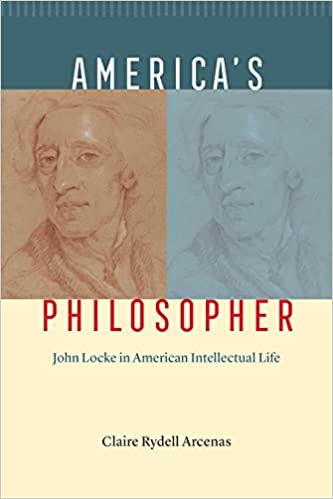Books Reviewed
John Locke’s influence on the American Founding is so overwhelming and obvious that only an academic could deny it. Not only did Thomas Jefferson lift two turns of phrase from the Second Treatise of Government when drafting the Declaration of Independence—the “long train of abuses” and the fact that men are “more disposed to suffer”—but Locke’s teaching on human equality, natural rights, government by consent, religious liberty, and the right to revolution constitute the bedrock of American republicanism, at both the national and state levels.
Among the colonists Locke was the most cited political writer between 1760 and 1775, the period when the revolution was effected in the minds of the people according to John Adams. The “great Mr. Locke,” as some called him, was read and praised not just by Adams and Jefferson, but also by Benjamin Franklin, Samuel Adams, Alexander Hamilton, and others. One of the signers of the Declaration, Benjamin Rush, called him “an oracle as to the principles…of government.” Thus, a plaque near Locke’s tomb at All Saints’ Church in the small Essex village of High Laver fittingly reads: “[H]is philosophy guided the founders of the United States of America.”
To acknowledge Locke’s tremendous influence on the founding is not to insist Locke et praeterea nihil (Locke and nothing else), or to deny there were other influences. Nor is it to assert that the founders were thoroughly Lockean, i.e., that they agreed with every last line in the Second Treatise (they obviously didn’t follow Locke’s conflation of the executive and judiciary powers when designing the Constitution). Rather, it is to recognize, as Steven Dworetz demonstrated in his authoritative study of Locke’s influence on the founding, The Unvarnished Doctrine (1990), that Lockean theory supplied “the concepts and categories in which the Revolutionaries articulated their deepest concerns about liberty and property.”
Despite mountains of evidence, scholars have for decades been attempting to downplay Locke’s influence. This should not be surprising. Given a sufficiently prominent topic in the humanities or the social sciences, academics will get around to arguing pretty much any position: Plato was a democrat, Nietzsche was a feminist, and the Civil War was about tariffs! The non-Lockean founding has been debunked repeatedly, most recently by my colleague Thomas West’s comprehensive study, The Political Theory of the American Founding (2017), but the Locke wars continue to rage.
***
Claire Rydell Arcenas, who teaches history at the University of Montana, has now joined the fray on the side of those who seek to downplay Locke’s influence on the founding. That she does so in a book entitled America’s Philosopher: John Locke in American Intellectual Life is all the more perplexing. She writes: “[I]t is entirely possible to write about Locke in the eighteenth century without mentioning the American founding documents or Thomas Jefferson in Philadelphia.” It is indeed possible to do so, but why anyone would even want to consider doing so in a book on Locke’s influence on America baffles the mind.
Arcenas does not so much argue against the Lockean founding as she just dismisses it. She devotes a mere three pages to Jefferson and the Declaration. By contrast, she devotes ten pages (in a book with only 169 pages of text) to the American critiques in the early 19th century of Locke’s aristocratic Fundamental Constitutions of Carolina, a work he was commissioned to write “as a lawyer writes a will” according to one scholar. An entire chapter of her book chronicles Locke’s declining influence in the academy after the Civil War.
But when it comes to the document which gave birth to the United States of America as a sovereign nation and articulated its fundamental political principles, the Declaration cannot be Lockean, asserts Arcenas, because it speaks of the pursuit of happiness, whereas Locke generally speaks of property in his Second Treatise. The two are, of course, deeply intertwined in Locke, as man’s earthly pursuit of happiness both requires property (in particular, what he calls “the conveniences of life”) and will result in the acquisition of property. As Pennsylvania representative John Dickinson concisely explained at the time of the founding:
I have a right to be happy. If there can be no happiness without freedom, I have a right to be free. If I cannot enjoy freedom without security of property, I have a right to be thus secured.
Arcenas also maintains, contrary to all evidence in our founding documents, that America is anchored in the idea of an “original contract” between the rulers and ruled, rather than the Lockean social contract among individuals to form a political community. She thus unwittingly adopts Franklin Roosevelt’s reinterpretation of the social contract.
***
Arcenas is, however, insistent that Locke the philosopher, theologian, and theorist was widely read and respected in early America. While reading the Second Treatise out of the founding, she magnifies the importance of Locke’s An Essay Concerning Human Understanding, The Reasonableness of Christianity, and Some Thoughts Concerning Education. Even then, although Arcenas offers evidence that Locke was read, she does not establish to what extent his ideas, in particular his most unconventional ideas, took root in early America. In the Essay Concerning Human Understanding, for example, which she emphasizes was his “best-known work,” Locke argues that things “are good or evil, only in reference to pleasure or pain.” Arcenas makes no mention of his hedonistic moral philosophy and we are left wondering what the American colonists made of such claims. Nor does she notice Locke’s repeated invocations of the “pursuit of happiness” in the Essay.
The remainder of the book describes how Locke’s influence waned during the Progressive era before waxing in the post-World War II era when Americans, in her telling, first discovered Locke the liberal political theorist and engaged him in the global fight against Communism. As Arcenas observes, Karl Marx is the third-most cited author, after Locke and Jefferson, in Louis Hartz’s celebration of America’s Lockean spirit, The Liberal Tradition in America (1955). Her last chapter focuses on Robert Nozick’s “Lockean libertarianism” and Willmore Kendall’s idiosyncratic reading of Locke and Kendall’s own efforts to downplay his importance to the founders.
The net effect of America’s Philosopher is to minimize both Locke’s philosophical brilliance and his influence on the founding and subsequent American history. His decisive contribution to American republicanism is not just obscured but denied. We are left with a series of vignettes about various Americans of secondary importance who read Locke and either agreed or disagreed with him, but we are never told who got him right.





